Whilst there no longer appears to be anything that is truly unusual in the current climate, the Chancellor took the unusual decision to cancel November’s planned budget statement and delivered a Winter Economy Plan in its place. This move once again underlines the lack of long-term certainty that the Covid pandemic is enforcing on the economies and markets of countries around the world.
With cases rising and the onset of what appears to be another spike, The Chancellor was forced to make a statement, laying out a package of further support for jobs and incomes, especially given his prior announcement that the Job Retention Scheme could not continue beyond the end of October.
Job Support Scheme
With jobs remaining the highest priority, the biggest announcement of the Winter Economy Plan was the creation of the Job Support Scheme. Deliberately given a different title and different focus, this scheme is designed to support companies actively employing staff, encouraging them back into the workplace and keeping them on payroll, rather than merely keeping them furloughed with Government support – so called ‘shell jobs’.
The Job Support Scheme will ensure that employees utilising the support will receive at least 77% of their pay. The scheme works by paying the employee for contracted hours not actually worked. The employee will have to work a minimum of 33% of their usual hours but for every hour contracted, but not required by the business due to reduce revenues or demand, the Government and the Employer will each pay one third of the employees usual pay. The Government’s contribution will be capped at £697.92 per month.
VAT reduction extended
The Chancellors plan also included extensions to a handful of existing schemes announced at the height of the pandemic in the late spring and early summer. One such extension is the continuation of the reduction in the rate of VAT for most aspects of hospitality and tourism. This was reduced from the prevailing rate of 20% to 5% in the spring for:
- supplies of food and non-alcoholic drinks from restaurants, pubs, bars, cafés and similar premises across the UK
- supplies of accommodation and admission to attractions across the UK
The reduction, which was due to run until January, will now continue to 31 March 2021.
Deferred VAT and personal taxes to be paid in instalments
To help avoid a cash flow crisis for many in Spring 2020, the Winter plan also included an opportunity for business and individuals to spread the repayment of outstanding taxes. Businesses who deferred their VAT due from 20 March to 30 June 2020 and individuals with deferred payment on account for self-assessment will now have the option to repay outstanding amounts in instalments during the 21/22 tax year. Aware that these amounts would have fallen due at the end of the tax year, along side other liabilities and potentially the start of repayments to Government loan schemes, this deferment will help ease cash flow pressures.
Time-to-pay threshold increased
Subsequent to the Winter Economy Plan being delivered, HMRC has announced that the self-serve, time-to-pay threshold is being increased from £10,000 to £30,000, effective 1 October. The threshold is the upper limit of tax liabilities that can be scheduled into instalments via the online portal, without having to speak to HMRC. It is now believed that 95% of customer, due to make a payment on January 31, 2021 will be eligible to use the self-serve, time-to-pay system.
Whether the Winter Economy Plan, delivered on Thursday 24 September, is expected to see us through the next six months or is merely phase one of the plan we will have to watch and wait. One thing is clear, at some point there will need to be a budget at which Rishi Sunak will have to share with us his plans for rebuilding the economy, addressing unemployment and repaying the billions of pounds (GBP) that the Government has had to pump in to support jobs and individuals.
